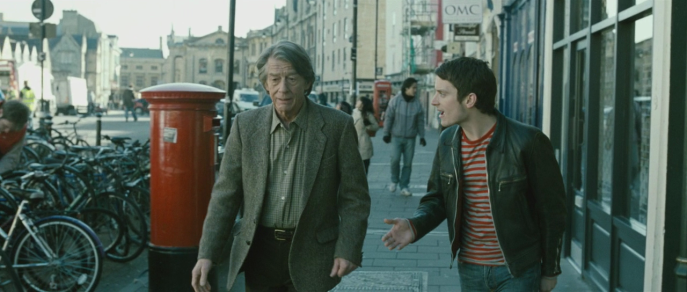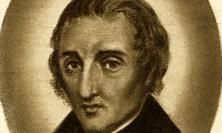Director: Álex de la Iglesia
Starring: Elijah Wood, John Hurt, Leonor Watling, Julie Cox
UK Release date: 25 April 2008
Certificate: 15 (110mins)
The Oxford Murders is an endearingly fallible telling of a story of mysterious deaths in the ubiquitous city of intellect. Enter the young, mathematically talented Martin (Elijah Wood), transatlantically transported by his adoration of the brilliant academic Arthur Seldom. Let there be a voluptuous foreign nurse for whom the two men compete. Cast above the Oxford skyline the kind of British skies made famous by their parts in The Bill. Give Martin a free American spirit so the frustrated Oxford women adore him. In other scenes, make him represent the obsessive, detailed world of academia. What do you mean that’s not possible? It is when the film opens with a shot of a surprisingly pretty Ludwig Wittgenstein composing his notebooks in the middle of no-man’s land in World War I, asking, Can We Know The Truth?
The Oxford that Martin encounters is a fairly bizarre place, in a different way to its previous part in The Golden Compass. There’s still a snaggle-toothed flower-seller under one of the bridges, but the rest of the denizens are a twisted, bitter group, none more so than Beth and her Enigma code-cracking mother. These two Havishams put up Martin with threats of German Scrabble and avant-garde cello concertos; meanwhile, he’s off getting a beating at squash by Nurse Voluptuous (Leonor Watling) and helping out his hunched roommate Uri Clichéovich Podorov (or something like that). It even has a practical British copper huffing and puffing at these meddling academics with their numbers and long words.
John Hurt’s ability to extend phrases past the limits at which lesser diaphragms fold gives Arthur Seldom a degree of charisma that makes even the gaudiest of the film’s intellectual decorations appear attractive. “It could be semantic, or syntactic, like a geometric sequence”, he muses over the rationale behind the murderer’s patterns; “soup, fish, dessert” replies Officer Practical. Fibonacci, Pi and the Golden Ratio all get their run-outs, leaving the cinema feeling a little like a more intelligent and no-less-nuanced extension of Disneyland’s “It’s a Small World”.
The problem with tortured geniuses on film is that unless you really, really believe that a man would want to lobotomise himself just so he could engage in a new type of thinking, their crises become rather hilarious. “Beth is NOT an electron!” Martin screams at one point, with Elijah Wood’s eyes doing their rolling best to convince you that this is in fact a serious issue.
For all this silliness, the film works, tapping into that mystery-solving pleasure that co-exists with a secularized form of belief about underlying patterns in the world. It’s curious to see the human fascination with secret codes work its way into popular culture: they always seem cheap versions of real complexity, seeing as they can be solved in 100 minutes. That’s the other problem with these type of codes, and to this one could add astrology, numerology and the like: the attraction lies in the knowledge remaining esoteric, but once the code has been uncovered then life is reduced to a textbook, with an index of explanations for every phenomenon. The Christian “textbook” doesn’t demystify everything: the Why? of our existence may be answered by Love, but that only shifts the mystery rather than deflating it: Love does not need archaic symbols for it to be a profoundly unusual, inexplicable thing. The Oxford Murders’ attempts to pattern the surface of life with indications of a deeper reality, and to have that reality solved within the film’s scope, means that watching it feels like reading one of those late night diary entries that seemed so profound at the time.
I’m inclined to view the film’s weaknesses with a kinder eye than usual, perhaps because of the patina of pleasure left by it’s enthusiasm. Its mixture of high and low brow results in a deformed but friendly looking physiognomy, and I shall leave you suitably mystified (I hope) with one of the mathematicians’ whisky-sodden proclamations: ‘for every modular form there is an elliptical curve and for every elliptical curve there is a modular form’. Solve that one.
Nathan Koblintz
![]()






